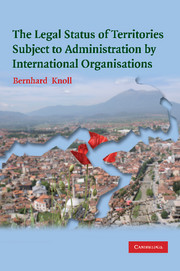Book contents
- Frontmatter
- Contents
- Illustrations
- Foreword: Pierre-Marie Dupuy
- Acknowledgements
- Table of Cases and Judicial Decisions
- List of Abbreviations
- Introduction
- 1 Creation of internationalised territories
- 2 Fiduciary administration: mandates, trust and the transitory sovereignty vacuum
- 3 Self-determination and the personality of internationalised territories
- 4 ‘The King's two bodies’: the dual functions of international administrations
- 5 Extent of UN authority in Kosovo and the problem of an open-ended institution-building mandate
- 6 The status process: Kosovo's endgame
- 7 An anomalous legitimacy cycle
- 8 Properties of a transitory legal order
- Concluding appraisal
- Bibliography
- Index
2 - Fiduciary administration: mandates, trust and the transitory sovereignty vacuum
Published online by Cambridge University Press: 11 August 2009
- Frontmatter
- Contents
- Illustrations
- Foreword: Pierre-Marie Dupuy
- Acknowledgements
- Table of Cases and Judicial Decisions
- List of Abbreviations
- Introduction
- 1 Creation of internationalised territories
- 2 Fiduciary administration: mandates, trust and the transitory sovereignty vacuum
- 3 Self-determination and the personality of internationalised territories
- 4 ‘The King's two bodies’: the dual functions of international administrations
- 5 Extent of UN authority in Kosovo and the problem of an open-ended institution-building mandate
- 6 The status process: Kosovo's endgame
- 7 An anomalous legitimacy cycle
- 8 Properties of a transitory legal order
- Concluding appraisal
- Bibliography
- Index
Summary
[I]f the essential basis of these rules, that is to say, territorial sovereignty, is lacking, either because the state is not yet fully formed or because it is undergoing transformation or dissolution, the situation is obscure and uncertain from a legal point of view and will not become clear until the period of development is completed and a definite new situation, which is normal in respect to territorial sovereignty, has been established.
Introduction: the challenge to patrimonial conceptions of sovereignty
The Mandate system and the extent to which the notion of trust was operationalised for the governance of peripheral territories provides the framework – understood as a German Rahmenerzählung, in which one story is told within another – for this chapter which traces the curious events that led to the internationalisation of the territory once known as South-West Africa. It seeks to embed the narrative of Namibia's international administration in a ‘fiduciary frame’ that spanned the Mandate and Trusteeship systems.
The analysis of the Mandate system and its transition to the UN Trusteeship system is a particularly rewarding task. The fascination stems from insights gained in appreciating the extent to which the normative repository of international law was accessed – and, while doing so, further developed and expanded – to enable a more effective response to anomalous situations.
- Type
- Chapter
- Information
- The Legal Status of Territories Subject to Administration by International Organisations , pp. 53 - 110Publisher: Cambridge University PressPrint publication year: 2008



